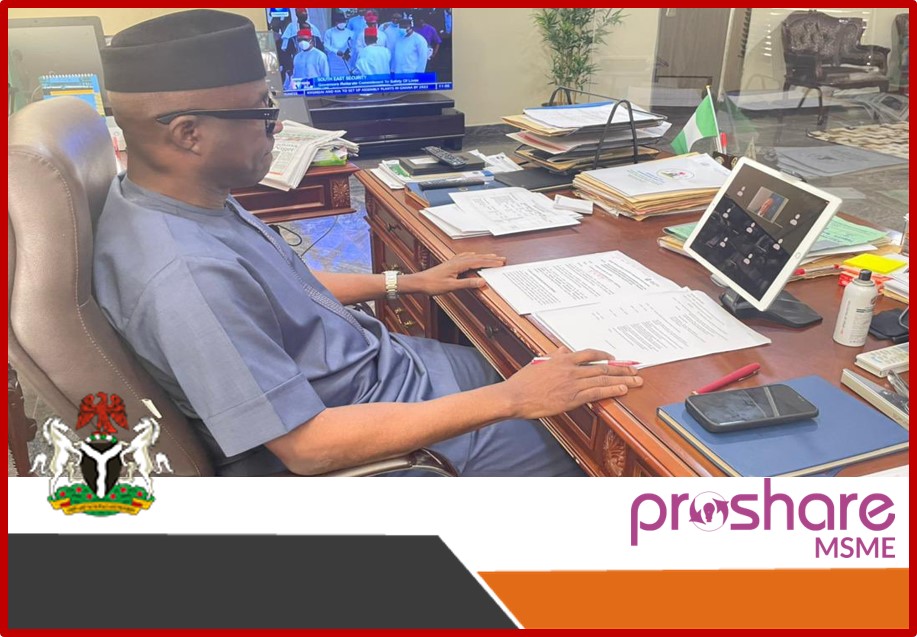Wednesday,April 28, 2021 / 08:11 PM / by Federal Ministry of Industry, Trade andInvestment / Header Image Credit: Twitter; @NiyiAdebayo_
Being a Keynote AddressDelivered Virtually by the HM
Protocols.
1. Let me start by congratulating the WorldIntellectual Property Organization (WIPO) on celebrating the World IP Day andutilizing this medium to promote awareness of Intellectual Property.
2. As you are aware, His Excellency, PresidentMuhammadu Buhari, GCFR has set a vision of building a thriving and sustainableeconomy that will generate wealth, create jobs and alleviate poverty.
3. This commitment is further underscored by thelaunch and implementation of the Economic and Recovery & Growth Plan (ERGP),the National Enterprise Development Programme (NEDEP) and Executive Order003.MSMEs are a major focus of these initiatives.
A. Micro, Small andMedium Enterprises (MSMEs)
4. Globally, MSMEs have been recognised as thecritical stimulators of economic growth due to their potential to create jobs,boost production and economic activities and reduce poverty. The recent surveysconducted by the National Bureau of Statistics (NBS) and the Small and MediumEnterprises Development Agency of Nigeria (SMEDAN) indicate that MSMEs inNigeria accounts for 48% of our GDP, constituting about 96% of registeredbusinesses and employ about 84% of the labour force.
5. Mosteconomies, particularly those of developing countries like Nigeria, stand onthe shoulders of Micro, Small and Medium-sized businesses. MSMEs arecharacterized by dynamism, innovation and their size also allow for fasterdecision-making processes.
6.Clearly, the importance of this segment to trade and commercial activities ishuge. Therefore, you will all agree with me that it is vital we provide supportto it.
7.Also, we are aware of the challenges that continue to weigh down MSMEs. Theseinclude inaccessibility of products to markets, lack of access to viablefinancing, a high regulatory burden, as well as the overall infrastructural deficit which spikes operational costs for these businesses.
8.Specifically, addressing the poor packaging, labelling and quality of goodsmanufactured by MSMEs is key to mitigating the rejection of "Made-in-Nigeria" products and ensuring sustainability in the global market.
9. Thedevelopment of the MSME segment falls under one of the strategic thrusts ofthis administration. This is evident in the various Federal GovernmentProgrammes and initiatives developed to enhance the growth of MSMEs, especiallyby addressing the critical challenges I mentioned earlier. Let me briefly highlight some of the government's ongoing interventions.
- Tofacilitate trade and market access, we have:
- Commenced implementation of Executive Order 003which mandates support for localcontent in public procurement for certain items such as automobiles,pharmaceuticals, ICT and uniforms among others;
- Commenced the process leading to the repositioning of the Nigeria CommoditiesExchange (NCX) to facilitate quality assurance of agricultural produce, reduce post-harvest losses for agriculturalproduce, act as a price discovery mechanism for farmers and other operators inthe ecosystem as well as enhance trade activities for operators in areas ofmanufacturing, agriculture, ICT and financial services;
- Launched an MSMEs Market Linkage Initiative aimed at facilitating market accessfor active MSMEs by keying them into the value chain of large organisations.This will bridge the gap, enable local content development and participation invarious sectors of the economy;
- Launched the "SheTrade Initiative" in collaboration with the InternationalTrade Centre to facilitate international market access for over 480,000Nigerian women entrepreneurs; o Commenced development of the SecuredAgricultural Commodities Transport and Storage Corridor (SATS-C) Policy tofacilitate the movement of Agricultural commodities through a safe and securedcorridor to three critical points: that is domestic, industrial and exportmarkets;
- Conducted twenty-seven (27) National MSME Clinic events at various locationsacross the country to massively boost the skills and capabilities of thissegment from which about 400,000 MSMEs have benefitted;
- To enable access to finance, we have put in place:
- AN500billion non-oil export stimulation facility with the Nigerian Export-ImportBank. This initiative will increase the export of processed agriculturecommodities to African markets;
- AN50billion Export Expansion Facility (EEF), an element of the Nigerian EconomicSustainability Plan (NESP) under which we will establish Export Trade Housesfor MSMEs in African and Emerging markets among other supporting initiatives focused on facilitating exports oflocally manufactured products;
- AUS$20million Technology Fund to be operated by the Bank of Industry towardssupporting young innovators and the technology ecosystem;
- AN90 billionfund which is provided by the Central Bank of Nigeria (CBN) foragriculture-based MSMEs;
- AN15billion Guaranteed Off-take Stimulus Scheme (GOSS), an important subset of theNESP which aims to provide an off-take mechanism for items produced by MSMEs.
- To ease the regulatory burden and foster quality assurance, we haveamong other measures:
- Launched the NAFDAC e-registration platform and significantly reduced productregistration cost by 75%;
- Exemption from Company Income Tax for businesses with revenue below N25million;
- Reduction of Company Income Tax to 20% from 30% for businesses with revenuebetween N25million and N100million;
- 50%reduction in the cost of registering MSMEs.
- To reduce operational cost for businesses, we have:
- Commenced rehabilitation of six (6) Industrial Development Centres (IDCs) whichaims to provide shared facilities to SMEs;
- Provided payroll support to MSMEs through the MSME Survival Fund to supporttheir cash flows during the pandemic.
10.This administration is highly committed to addressing these challenges bycreating a stable policy and regulatory environment that will support ease ofdoing business reforms in Nigeria. This would take into consideration policiesthat facilitate trade, attract foreign investment and protect businesses fromavoidable regulatory burdens.
B. On Intellectual Property...
11.Needless to say, Intellectual Property has the potential to immenselycontribute towards the harnessing of talent, development of technical know-how,specialization in the production and export of modern technologies and theoverall growth of the economy.
12.Sadly, over the years, Nigeria has become a target destination and transitroute for counterfeit and pirated goods. Foreign and local traders flood themarket with cheap, sub-standard products while local manufacturers illegallyimitate products of established brands.
13. Inthe last 10 years, Nigeria has been ranked among the top 10 countries wherepiracy is most prevalent with the average rate hovering between 80% to 90%. Thisis attributable to:
- Lowpublic awareness about which Intellectual Property rights are protected underthe law;
- Ineffective mechanisms for the protection and enforcement of such rights;
- Lackof coordination among various agencies of government involved in thedevelopment and protection of Intellectual Property rights; and
- Inadequate sanctions for infringements.
Allthese largely make holders of registered Intellectual Property rightsvulnerable to infringements.
14. Aweak Intellectual Property protection regime hinders foreign direct investment(FDI), innovation, research and development and technology transfer.Furthermore, this will negatively impact entrepreneurs and consumers.
15. AsNigeria increasingly becomes an important economic hub within the Africancontinent, the protection of Intellectual Property rights in the country is notonly strategic to our current drive to develop the non-oil sector but alsocentral to its overall economic growth and development goals.
16.Therefore, comprehensive reform efforts are needed to strengthen IntellectualProperty rights in Nigeria specifically in areas of registration, protection,enhancement and enforcement.
17. TheTrademark and Patents Registry within the Federal Ministry of Industry, Tradeand Investment has commenced the digitisation and automation of trademark andpatents to create a database, automate application processing and ultimatelyoffer adequate protection for holders of trademark and patent rights. This isto foster the confidence of businesses across various sectors and strengthenconsumer assurance.
18. TheNigerian Copyrights Commission (NCC), after the execution of the memorandum ofunderstanding with WIPO Arbitration and Mediation Center on Alternative DisputeResolution (ADR) in December 2020, have enabled MSMEs to adopt an alternatesystem for dispute resolution in diverse fields of intellectual property,including copyright, instead of resorting to court litigation. This will ensurethat disputes are resolved amicably without the cost of legal proceedings.
19.Consequently, the initiation of purposeful collaboration between governmentagencies - such as theFederal Ministry of Industry, Trade and Investment, theNational Office for Technology Acquisition and Promotion, the NigerianCopyrights Commission among others and private sector organisations willdevelop policy frameworks towards addressing Intellectual Property rightsinfringements in Nigeria.
20. Onthis note, I wish all the speakers and participants a successful deliberation.Thank you very much and God bless the Federal Republic of Nigeria.
Related News
- JA Nigeria Partners for Growth, Empowers Young People and Grooms Digital Entrepreneurs
- Call for Proposals for Small and Medium Enterprises in Nigeria
- MSMEs: A Path to Recovery
- Ecobank Nigeria Launches Radio Programme for SMEs
- Why The FG Should Work With Clusters On MSME Interventions - Ayo-Bankole Akintujoye
- 4 Affordable Hosting Providers for Startups to Consider
- How to Manage Your Business from Home
- FG Flags off The Implementation of N75bn MSME Survival Fund
- Why Nigeria's Regulatory Environment Is Vital For MSME Development - Muda Yusuf
- KPMG SME Report: Firstbank Named Biggest Mover In 2019
 Lagos, NG • GMT +1
Lagos, NG • GMT +1











 1241 views
1241 views









 Sponsored Ad
Sponsored Ad
 Advertise with Us
Advertise with Us









